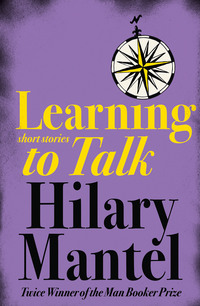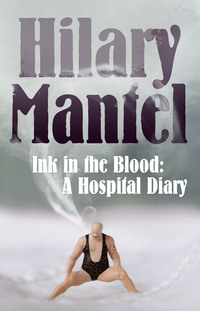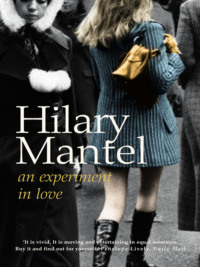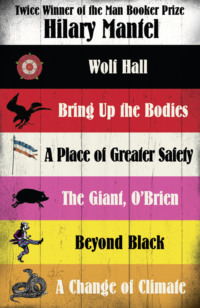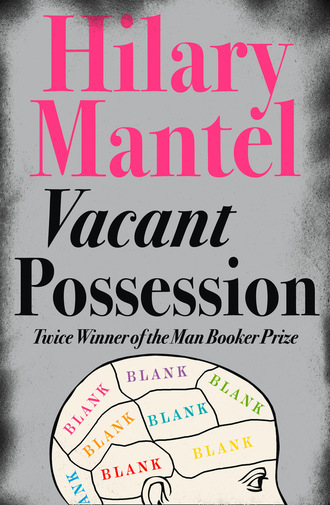
Полная версия
Vacant Possession
Just as well. Her ignorant body had done the battling for her. Christmas Day, 1974, she’d told him she was pregnant again. He’d given up Isabel so that Claire could be born, and grow up plump and cheeky, and get Brownie badges.
That had been a bad year; the guilt, the deception, the hopeless months that follow the end of an affair. Lately, and unwillingly, he’d begun to think about Isabel again. Change was in the air, an undercurrent of disturbance. He couldn’t account for it.
‘You’re miles away,’ Sylvia said, clattering at the sink. She crossed to the table and scooped the orange peel into her palm, and dropped it in the bin. ‘You’ll be late if you sit about any longer.’
Colin looked at his watch. ‘Good God, twenty past eight.’ He threw the paper down. ‘Have a look at it, about the Minster. It’s awful.’ He snatched up his jacket, made for the door. ‘Come on, you kids. Take care, see you about six.’
What I should do, Isabel thought; what I should do is, I should start writing it down. I’d like to write down everything that worries me, about my life ten years ago. I’d like to write it. But I can’t find a pen.
Isabel’s brain moves slowly these days. She’s only thirty-four. She shouldn’t find thinking such an effort, and she shouldn’t look such a wreck. Perhaps a sense of foreboding dogs her. That must be it.
If she had any paper, she wouldn’t have a pen. When she was a social worker, she always had pens. She was organised; to a degree.
She was not organised now; she had just moved house, not unpacked yet. Here I am again, she said to herself, where I grew up and began my professional career; and had my first love affair. If that is what you call it.
It’s not fair, she thought. I never wanted to come back here. I might meet Colin in the supermarket. I might meet his sister, Florence. Then again, I might meet Sylvia. I’ve never seen Sylvia, but I feel I’d know her at once. Instinct, if you like. Women who have shared a man can probably scent each other out.
What about this shopping list? She turned it over. She could write on the back, why not? Just to get started was the main thing, to get some relief from the thoughts going round and round in her head. A good search through her handbag turned up a biro. She sat down at the kitchen table. She took a deep breath. Yes, I might meet the Sidneys en famille, she thought. Then again, I might meet my old client, Muriel Axon. That would be worse.
‘Ten years ago, I lived in this town, I was with Social Services, I was seeing Colin. I lived at home with my father; that was all of my life. But I had this case, and this is the case I want to write about. Muriel Axon, No. III/73/0059. Everything about this case bothered me. It still does.
‘Muriel Axon and her old mother Evelyn lived at number 2, Buckingham Avenue, in that part of town where people have big gardens and keep to themselves. Next door to them, but round the corner on Lauderdale Road, lived Colin’s sister Florence Sidney. We didn’t make that connection until the end. Why should we? When I met Colin – sneaking off to some pub somewhere, hoping we wouldn’t meet anyone we knew – we didn’t talk about his sister, and where she lived, or my clients and where they lived. But if I had known, I might have been able to ask Florence Sidney about her neighbours. Get some sort of – clarification.
‘Then again, I don’t know if I wanted clarification. I was afraid to find out what was really going on in the Axon household. Later, when it was all over, and Muriel’s mother was dead and Muriel herself had been put in hospital, their house came on the market and Colin bought it. He wanted a big house, and to live next door to his sister. He got it cheap.
‘I did warn him against it. I saw him at the inquest, and I told him I wouldn’t care to live there. I tried to convey to him that horrible things had happened in that house. He wouldn’t take a hint. I couldn’t do more than hint. I really didn’t know. I couldn’t expose my imaginings. I would have sounded superstitious, unbalanced, and he already thought I was that. By that time, everything was over between us.
‘After all, it’s just a house. Just an empty shell, when the people are taken away.
‘I expect I’ll find out how Colin’s getting on. This is a small town. They’re all around, I’m sure; old colleagues, old clients, old lovers. Of course there was always a risk, with Jim moving about for the sake of his career. If you’re in banking and you want to get to be a manager quite young you have to be prepared to move about. I’d rather have stayed in Manchester.
‘But I couldn’t produce any good reasons why we shouldn’t come back. Not reasons that convinced Jim. He doesn’t take much notice of my opinions. That’s understandable. I’m always crying, you see, bursting into tears, and falling over, and losing things. I was in banking too when we got married – I thought it would be restful and uncomplicated – but now I just sit about at home.
‘I’m not fit for anything, Jim says. He wonders what’s the matter with me. I spend my days thinking.
‘So I thought I could write a book, you see, about the Axon case and all that, and when it was done I could send it to the Sunday papers, and then everyone would know how social workers operate and why things go so badly wrong. How you get cases you can’t handle, and how clients conspire against you, and circumstances seem to conspire too. How it messes up your personal life. How you live with yourself afterwards; when disaster has occurred.’
That will do for a preface, she thought. I can call it Confessions of a Social Worker, I suppose. She had long ago overflowed the shopping list and been forced to write on the piece of packing paper that had come around the teapot. The spout had got broken, but it didn’t matter; there wasn’t much call for tea. I’ll buy a proper notebook later, she thought, on my way to the off-licence.
It was 12.30 pm when Sylvia came home from the CAB. In the hall she paused and called out, ‘Hello, Lizzie, all right are you?’ A clattering from the kitchen told her that her daily woman was hard at work. What a comfort to have the basics taken care of, she thought. She told herself that she hated housework, though in fact for most of her married life it had been her pride, pleasure and retreat.
Going up the stairs, dragging her feet in their striped trainers, she acknowledged that she felt tired. The wrangle at the breakfast table was always a strain, and now her head was buzzing with Social Security regulations and unanswered questions about the legal aid scheme. The house was quiet. She went into her bedroom, kicked off her shoes and lay down on the bed. Her eyes closed; she dozed for five minutes, wrapped in the midday heat. Suddenly a shrill ringing brought her upright, shocked out of sleep. Damn that cooker timer, she thought, it’s gone off by itself again. Why doesn’t Lizzie stop it? Heart still racing, she padded over to the door. Opened it; the ringing stopped. She sighed. Better turn out those drawers, I suppose. Skip lunch. Don’t need it, this weather.
She knew that if she began with the bottom drawer, she would find her photograph albums; and then she could sit on the bed and browse. It was something she’d not done in ages. She’d never had much time to herself. Lizzie’s advent had been a blessing – even if she was a bit odd. You didn’t engage a cleaner for her looks or fashion sense, or for her conversation; you just needed someone honest and with a bit of initiative. Lizzie always reminded her of how she’d come up in the world. She reminded her a little of someone she’d known before her marriage; one of the girls on the Pork Shoulder line.
She leaned back against the pillows. Wedding pictures, baby pictures; Suzanne grinning in her pram in the postage-stamp garden of their very first house. Suzanne had left home now, was studying geography at Manchester University. Then Alistair, scowling from under a woollen hat in the same pram. It was very like his present scowl, except that now he had more teeth. Here was Karen, two years old, digging in the garden of their house on the estate. Here she was again, a little older, mouth drooping, swinging on the rickety gate. Everything about that house had been rickety, leaky or shoddy; it was a triumph of jerry-building. No wonder they’d been keen to move to Buckingham Avenue, despite its neglected and depressing condition.
The move had been a stroke of luck for them. With Claire on the way, they’d needed a bigger place; but how to afford it? Normally she’d never have considered the Lauderdale Road area – all those big detached houses, too gloomy and too expensive. Colin had grown up on Lauderdale Road, and his sister Florence, who had never got married, still occupied the family house; his father was dead, and Florence had put their mother in a home. Florence had called her up one day and said, ‘The Axon house is on the market, just round the corner, the one with the garden backing onto ours. You ought to enquire about it.’
‘What?’ she’d said. ‘That place where those two peculiar women lived? It’s falling down.’
‘It’s going cheap,’ Florence had said. ‘Suit yourselves. But you could do it up.’
Sylvia suspected Florence’s motives, of course. She was possessive; she wanted her brother next door, on call for mending her fuses and unblocking her sink. But still … out of curiosity, Sylvia phoned the estate agent.
‘It is in need of sympathetic renovation,’ the man confirmed, ‘but it’s basically very sound. Of course, it’s very well situated. Within easy reach of shops and schools – ‘
T know where it is. Why is it so cheap?’
He’d dropped his voice, become confidential. ‘Can’t say too much, bit of a sad case – old lady’s died, and her daughter, she’s not quite right, know what I mean? Gone into hospital.’
‘You mean they’ve put her away?’
‘The old mother died suddenly, there was an inquest. It was in the paper, in the Reporter.’
She didn’t say, my husband was there when she died. That was irrelevant. But they’d wondered what had happened to the Axon girl. Not that they’d known the Axons, really; they were the kind of neighbours you didn’t set eyes on from one year to the next. ‘What hospital has she gone to?’
‘As to that, I couldn’t say. You see what it was, madam, they were recluses. They didn’t like other people in the house. So they didn’t keep up with repairs. Well, two ladies, you don’t expect it. But it’s a lovely property.’
‘All right. When can we have the key?’
They’d been to see it together. Florence met them at the gate. ‘Well?’ She was anxious that Colin’s decision should not be coloured by the unpleasant episode that had taken place in the house a few weeks earlier. He’d called on Florence late one afternoon, fortunately as it turned out; plodding out through the twilit garden to inspect, at her request, a dubious bit of guttering, he’d noticed something very strange going on at the Axon house. At an upstairs window, a young woman was gesturing, calling for help; very odd, but Colin hadn’t hesitated. Florence had watched amazed as he crashed through the shrubbery and pounded on the Axons’ back door, ready to break it down. Once inside he’d raced up the stairs to let the girl out; Mrs Axon had pursued him, only to meet with an accident. It came out later that she’d had a heart attack, as well as a fall. Colin had given artificial respiration; with no result. And the young woman? She was a social worker, making her calls; the old lady had tricked her into the spare bedroom and turned the key. God knows what else had been going on at number 2. Would Colin want it?
‘Well,’ he’d said cautiously, ‘it’s cheap. It needs work.’ But if the last occupants had left shadows, he thought he could dispel them. ‘We could cut some of these trees down,’ he said. ‘Let some light in.’
‘Yes,’ Sylvia had said. ‘Then Florence could see in our garden, couldn’t she?’ She was not enthusiastic about that. But the trees would have to go, and all the junk that the Axons had left behind them; and that little glasshouse that the agent had called a conservatory, with its cracked and grimy panes and its mound of cardboard and newspapers all festering and damp. What a clean-up job! But think of the possibilities…
So they had put down a holding deposit, and Colin had called the solicitor. Contracts were exchanged within weeks. Their married life had been full of upheavals; this was the only thing that had gone smoothly.
Sylvia turned back to her albums.
How the photographs improved, from shiny dog-eared scraps, faded brown with age, to the borderless silk prints of recent date. Here she stood before the front door of Buckingham Avenue, her arm through her husband’s. Florence, she thought, must have taken the picture. Behind them, the house looked like the set of a Hammer Films production; that ugly stained glass in the front door, those great clumps of evergreens shading the paths. The woodwork was rotting, the downspouts were in a deplorable condition; and the two figures who stood before it were hardly in a better one. Colin must have been fourteen stone there, she thought. Look at his belly hanging over his belt. Look at the silly expression on his face.
Her own image offered little comfort. Her tight skirt – surely unfashionably short? – emphasised her large hips and stocky legs; she was still out of shape after her recent pregnancy. Here she was, holding the new baby Claire, peeping at the camera with a simper above the infant’s shawled bulk. Her hair had been bleached out to a strawlike mess. Had she not known that backcombing and lacquer would ruin it? Worse, had she not known that no one else had used them for years?
No doubt at the factory, she thought, we were behind the times. We didn’t know any better. She accorded an indulgent smile to her teenaged self, making up for a Friday night out, scrubbing her fair skin until the aura of animal fat, sodium polyphosphates and assembly-line sweat was completely wiped away and she moved in a mist of Yardley’s cologne and heart-skipping expectation towards the weekly dance; off she went, a great big beautiful baby doll. Then, on the seven o’clock train, she had met Colin.
It was an awful photograph, why had she ever kept it? Quickly she detached it from the page and put it down on the bedside cabinet. There was a blank space now in the album, a testament to her vanity. There she was again, arms folded outside number 2. The garden had been dug over, and the house behind her had all its woodwork painted a gleaming white. It had been a gruelling yearlong slog, up and down ladders with buckets of paste, backbreaking work; but it was a big house, and there was land at the side to accommodate the extension they had eventually built, giving them a fourth bedroom and a much bigger kitchen. That was the whole point about Buckingham Avenue, it offered such scope for improvement. How much easier it would have been if their removal had not coincided with the crisis in Colin’s life. There had been a girlfriend, of course; he supposed she didn’t know. His behaviour was odd and abstracted, even by his own standards. He had drunk too much, whenever he could get his hands on some alcohol; they could not afford, in those days, to keep a stock in the house. Their petrol bills had soared; where did he go? Finally, of course, he’d been breathalysed and banned from driving. His little affair had come to nothing. That was obvious, wasn’t it? He was still here, she was still here; here they were.
Sylvia looked at her watch. Ten past one. She let the albums slip onto the bed, yawned, stretched, and peeled off her tracksuit, dropping it into the laundry basket. She went into the bathroom, washed, and cleaned her teeth vigorously. Back in the bedroom, she averted her face to avoid the sight of herself half-naked in the dressing table mirror. Her thighs were going, her tummy had gone; after four pregnancies, what could you expect? If she had known then what she knew now … She pulled on her baggy cotton trousers, and took out of the drawer a tee shirt which said in big black letters NURSERY SCHOOLS ARE OUR RIGHT. Running a hand through her hair, she mooched off downstairs.
Lizzie Blank, the daily (a German name, Sylvia supposed), was standing at the sink wringing dirty water from a cloth. ‘All right, Lizzie?’ Sylvia said.
‘All right, Mrs S?’
Sylvia crossed to the fridge. She opened it, picked out a lettuce leaf, and stood nibbling it while she surveyed her domestic. She supposed that a survey of Lizzie Blank would be a comfort to any normal woman who was afraid of losing her looks. Weird was the only word for her.
Lizzie Blank was a woman of no age that could easily be determined. Her dumpling body, entirely without a waistline, was supported on peg-shaped legs. Her hair, platinum blond and matted, had a height and stiffness that Sylvia’s in its heyday had never approached; two little squiggles, shaped like meat hooks, stood stiffly out by each ear. Her large face – rather blank in truth – was so caked with make-up that it was impossible to decide what it might look like naked, and her eyelids, outlined in thick black pencil, were painted a vivid teal blue. How many pairs of false eyelashes she wore, Sylvia could not take it upon herself to say. Her magenta lips bore no relation to her real mouth, but were overpainted greasily onto the skin, so that the merest twitch of her cheek muscles brought about a smile or a pout. The lips worked unceasingly; the eyes remained quite dead.
‘How was your trip?’ Sylvia asked.
‘Okay. One of us thought there would be donkeys. We had them before, when we went on a day trip.’
‘I think you only get them at the seaside.’
‘I don’t see why. Not as if they swim.’
Sylvia was taken aback. ‘Tell me, Lizzie,’ she said, ‘do you wear a wig?’
Lizzie only smiled. Sylvia realised that her question was perhaps an intrusion. After all, she thought, if it is a wig, it’s bound to slip about on her head from time to time. I could find out by observation alone.
Sylvia swung open the fridge door again, took out half a cucumber, and cut an inch off it. She raised it to her lips. ‘By the way, you didn’t try to clean Alistair’s room, did you? I meant to tell you. I expect he’s got the door locked.’
‘The spare room?’ Lizzie looked at her; it might have been astonishment, but her face was so far from the human norm that it was always difficult to be sure what her expressions meant.
‘Well, it’s not really the spare room. Alistair’s always had it, since we came.’
‘I call it the spare room.’
‘I daresay it was, before we moved here. Anyway, what I’m saying is – don’t bother with it. His father will make him clean it up, when the school holidays start.’
‘Some rooms have no talent for cleaning. Some rooms will never be clean.’ Her tone was perhaps unnecessarily doom-laden, but Sylvia supposed she was devoted to her art. It was a good sign really.
‘I was wondering, would you take on another lady?’
Lizzie was washing down the sink with bleach. She shook her head, without pausing in her work.
‘Only, our vicar’s wife is looking for somebody to do a few hours for her.’
‘Did you say you could recommend me?’ Lizzie turned her full flat face towards her employer; her rouged cheeks glowed, ripely pink, in a waste of chalk-white powder.
‘I mentioned your name. I didn’t commit you.’
‘Not interested, Mrs S.’
‘I did tell her, I didn’t know how many other people you did for.’ Biting her cucumber: ‘You’re a bit of an enigma, Lizzie.’
‘I can’t take anything else on.’ Lizzie screwed the cap back on the bleach bottle. ‘I work at night.’
She bent down to put the bleach away under the sink, presenting to Sylvia her large rear end. ‘Yes, well, I thought I’d ask. I’d better get off to my committee meeting. Can I give you a lift?’
Lizzie took off her large plastic apron and hung it behind the kitchen door. ‘Thank you kindly, Mrs S. You’re a good woman. An angel, I might add.’
With a baffled smile, Sylvia went off to get her purse. Weird was the word. As it happened, though, Lizzie Blank was the only person who had answered her ad in the Reporter. The purplish, pinpoint, foreign-looking hand had prepared her for – well, a foreigner; a person of strange diction and eccentric ways of cleaning lavatories. Lizzie did not seem exactly foreign; but perhaps her parents were, perhaps she came from a funny background. She seemed a good-hearted soul, Sylvia thought, and willing enough; even if she was rather lavish with the cleaning materials.
She went back into the kitchen. Lizzie Blank was now in her outdoor garb; a dirndl skirt of red and blue, and a leopard-skin jacket. ‘I’m surprised you don’t feel the heat,’ Sylvia said, counting out her money. ‘There you are, love.’ Lizzie’s false nails flashed, and the notes vanished into one of her pockets.
‘It’s my pride and joy, this jacket,’ she said. ‘As my mother used to say, Pride must Abide.’
Lizzie took out a chiffon scarf, pink shot through with gold, and went out into the hall. In front of the mirror, she adjusted it carefully over her coiffure. ‘Ready?’ Sylvia said, swinging her car keys. ‘You’ll have to give me directions.’
Damn, she thought, I’ve been stuffing myself again; and I meant not to have any lunch.
They drove downhill towards the town centre. Right here, left here, said the charwoman, leading them into the maze of streets that still stood on the southern side of the motorway link. ‘All this will be coming down soon,’ Sylvia said. ‘You’ll all be dumped over Hadleigh way in a high-rise. How do you feel about that?’
‘All right.’
‘But it’ll break up your community.’
‘Not my community. I wasn’t born here.’
‘Oh, I see. But still, you won’t like life in a towerblock.’
‘I shan’t mind. You can throw things off the balconies.’
Sylvia gave her a sideways look, then switched her attention back to the road. She slowed down. Small brown children played by the kerb, barelegged in the July heat, crouching in the gutter and darting out into the road. There was not a blade of grass for miles. Midsummer brought out the worst in it, baking the cracks in the pavements, raising a stench from the dustbins. The long ginnels that ran between the houses discharged a dim effulgence of stale sweat and stale spices; a thin ginger cat slept on a coal-shed roof, its scarred limbs splayed, its eyes screwed tight against the glare. Not a tree, not a patch of shade. ‘Displacing people from their environment,’ Sylvia said. ‘You’d think the lesson would be learned by now.’
‘Here it is. Eugene Terrace.’
‘Whereabouts?’
‘This will do.’ Lizzie opened the car door and began to lever her bloated body out of the seat, swivelling sideways and kicking her feet over the kerb. Her ankle chain flashed in the sunlight. Out at last, she leaned down and stuck her face in at the passenger door. ‘Thanks a million, Mrs S.’ Inside the leopard-skin jacket she was perspiring heavily, and patches of grease were breaking through her face powder; she gave a terrifying impression of imminent dissolution, as if fire had broken out at Madame Tussaud’s.
Sylvia drew back from her grinning mouth and heavy scent. ‘Is this where you live, at this shop?’
‘Over the top. It’s temporary. I’m stopping with a friend, he’s got lodgings here.’
‘See you Thursday then.’ She watched Lizzie, waddling towards the side door of the fly-blown corner grocery. I wonder what she means about working at night? Can she possibly be a prostitute? Surely not; she was too grotesque for anyone’s taste. Lizzie stopped, ferreting in her bag for her door key. There was something unreal about her, as if she were a puppet, or an illustration loosed from the pages of a book. Suddenly, and with awful clarity, Sylvia understood her mingled repulsion and fascination, the prickling of kinship which had made her take the creature on. It was herself she was seeing, Sylvia Sidney of ten years back, the masklike maquillage, the jelly-flesh wobbling like a sow’s; the great big beautiful baby doll. She felt suddenly sick. She groped for the gear lever.
Lizzie Blank, known otherwise as Muriel Axon, turned her key in the lock; and entered the dismal passageway of Mukerjee’s All-Asia Emporium.


